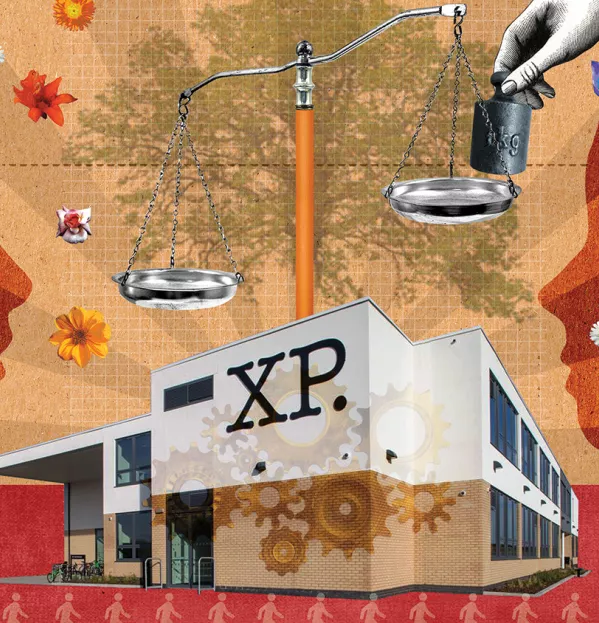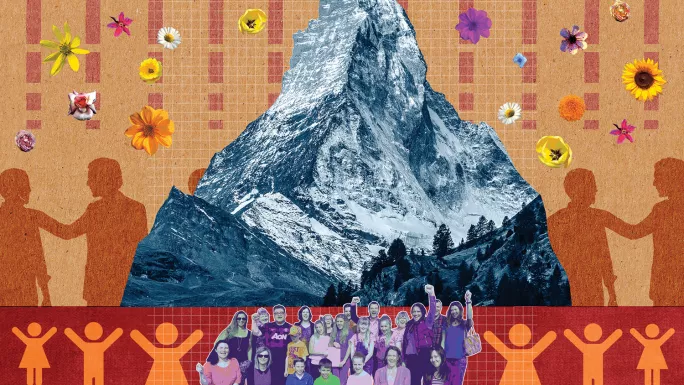Forget social mobility: it’s all about social equity

We’ve all been there. The alarm fails to go off; your phone hasn’t charged overnight. You’re going to be late. A frantic search for the clothes that you thought were clean proves frustrating as you realise you’d actually dreamed they were clean while still half asleep. Suddenly, the world tips into a spiral of catching up, childhood adages about “more haste less speed” bounce around your head, and you commence an ultimately fruitless search for bread to make toast.
Then your transport lets you down. The car won’t start - or perhaps your bicycle has a flat tyre - compounded by the fact that it’s now raining. Your thoughts turn to a family row the night before, which, to be honest, resulted in a fitful night’s sleep.
Now your bus is late, or maybe the train you managed to squeeze on to has suddenly stopped in the middle of nowhere. You reach into your bag as you sway perilously among your fellow commuters and discover, to your horror, that your purse or your key or your work tablet is missing.
Finally, you arrive, but you know that your mind isn’t with you. It’s at least half an hour behind, still making its morning journey. To cap it all, your boss is tapping their watch, and you know that means trouble.
Sometimes, as adults, the day can be an uphill climb. Now, imagine you are 12 years old.
On any bustling day, millions of students head off to school. Some arrive by car, bicycle, train or on foot. Everyone brings their own baggage, and it’s not just their PE kit. That metaphorical baggage can be, as we know, the biggest predictor of success in education. Home life has a massive influence on outcomes for every child. So, how do you make the difference, level the playing field?

At XP, a schools trust in Doncaster with two 11-19 mainstream schools, social equity is considered fundamental. It is why I get up every morning - to provide our children with the opportunities that I wish had been available to me. This starts with mutual respect, and the idea that we are all equal. That nobody is “better” than anyone else.
This is why I feel that the term “social mobility” is so insidious. The idea of social mobility negates so many positives in the individuals we work with and the community of which we are part. Social mobility says to me that “up there”, “over there” - anywhere but “here” - is better. It says that the person you are, what makes you unique, isn’t necessarily valued. To be socially mobile implies moving away from your sense of self and cleaving to a different culture and place.
There’s a whiff of accepting the status quo about the idea of social mobility, too, in that it only recognises an order and make-up of society that has always been there. You can’t change it, only join it and move up it.
In contrast, I believe social equity is about having the chance to become the best version of you. Having the knowledge and experience to recognise where your choices are, and how they can enhance your life, can also impact positively on your peers, your community and - yes - the world. The bigger picture is about a happier, more motivated and more cohesive society - one that the drive for social mobility doesn’t address.
At XP, we know that our students will make a difference in the wider world, that they matter, and they have a keen and undiluted sense of their worth, as well as an inner moral compass with which to navigate.
Four things we focus on to help us create and deliver social equity are: the concept of “crew”; the quality of our teaching; shared leadership; and the development of positive relationships.
1. Join the ‘crew’
There are four crew groups in each year. Supported by a member of staff, daily 45-minute crew meetings take place first thing in the morning and address any issue that a student wishes to share. These sessions can include simple check-ins after the weekend, getting a portfolio ready for a student-led conference, a physical activity or a book club.
Each crew contains about 12 students, and the crew leader has a keen sense of every student’s progress and a proactive relationship with parents and other staff members.
This ensures that if something needs to be addressed, it is acted upon. For example, check-ups on academic work or addressing issues from appropriate PE kit to monitoring interventions.
This daily opportunity to touch base in a relaxed environment really helps to give all staff the clearest picture possible of all the students - including their work and life in and out of school. The power of this sense of family and belonging is palpable. The maturity and empathy that students develop as part of a crew gives them an air of expectation and positivity, but without arrogance or a sense of entitlement.
2. Empowered teachers
We believe that professional development and collaboration are paramount. We support this with 15 staff days a year, which are designed to acknowledge that a teacher’s passions often extend beyond their core subject. The staff days mean that teachers have time to construct and control their timetable together, which brings a sense of ownership and integrity.
Typically, we have six lessons on each school day. After crew, students have cross-subject “expedition sessions” with a mix of science, technology, engineering, maths, and humanities, including English, history and arts. On three days a week, students also have what we call X Block “exploratory” sessions, which allow us to teach subjects that might not fit neatly into learning expeditions, such as music, computer science and drama.
With core elements already mapped into the timetable, there is flexibility to bring new experiences into the curriculum as part of individual experiences. The staff can build on this template; ideas flow, the research begins and key experts and partners are contacted to become part of new projects.
The curriculum comes to life with visits, partnerships and the production of actual products. A book, Doncaster: What Does Our Community Owe to the Miners?, published as part of the expedition sessions, is available in Waterstones and is still selling, six months on from its launch.
Peer-to-peer coaching, enhancement and inclusion of staff skill-sets aids continuous development. For example, we have a staff member who is a “dementia champion” - a trained volunteer who encourages others to learn about the condition - which contributed immeasurably to a project that involved the charity Age UK.
We also recognise that personal growth is paramount for teachers. New staff have a three-month induction, and peer support that says “I’ve got your back” - and the results of this speak for themselves. In the four years of our existence, we have not paid a penny for cover. Staff morale is high and this, in turn, communicates a sense of optimism and opportunity to the students.
3. Shared leadership
XP isn’t hierarchical. There’s no “head office”. The staffroom is labelled “Mission Control”, and the reception and office areas are open and inclusive. Students don’t have to knock as they can see where everyone is and who’s free to speak.
There’s a distributed leadership, and everyone - teachers, students, trustees and parents - knows how the school works and what it stands for. The pride and connectivity is powerful.
“Ambassador tours” for visitors who want to learn more about XP are a regular part of school life. Tours are conducted by two students (the “ambassadors”), whose knowledge about what they do and why they do it is second nature to them.
This ownership brings empowerment in the most positive way possible, which means that our students challenge the status quo. They have a sense of their own worth, which does not have to be validated or nurtured by a set of social rules and hierarchies that they don’t recognise. Social equity at its core empowers people to be the best they can be and doesn’t seek to set one role or skill above another.
4. Better relationships
Relationships in schools are a window into society. They reflect the world beyond, so to make change happen in society, the mindset of a school community must live that model; be that change. There are some simple but hugely significant things we do that help us achieve this.
When Year 7 students arrive at XP, they get straight on a bus and go to Wales for an outward bound experience.
Before they even set foot in a classroom, they learn about each other in an atmosphere of cooperation, support and teamwork. They experience helping each other up the mountain in every sense.
Weekly community meetings are also a time for reflection and peer support. These are whole-school or year-group gatherings (we have 50 students in each year).
Here, appreciations, support and pledges take place - for example, one student might wish to thank a peer for support with work, another might just like to acknowledge help from a staff member. There may also be a pledge to improve behaviour from a student.
The candid, confident and mature way the students - with staff guidance - respond to these meetings is inspiring.
Last year, we worked with the Relational Schools Foundation as part of a new report looking at the quality of relationships at XP. It found that our relationships - whether student to teacher or student to student - were significantly healthier than the benchmark average.
It matters to us that we can share some of the practices and policies that have made this happen. We know social equity is not just a glib, catch-all, socially aware, politically correct soundbite.
A crucial piece of feedback in our “outstanding” Ofsted report in September said this: “There is no ceiling to the standards that pupils can reach”, with disadvantaged students often outperforming their peers “because staff and leaders know these pupils very well”.
We don’t always get it right, but we never give up and we try to collectively learn every day from what we do. There’s no “them” and “us” at XP.
Gwyn ap Harri is chief executive of the XP School Trust in Doncaster
You need a Tes subscription to read this article
Subscribe now to read this article and get other subscriber-only content:
- Unlimited access to all Tes magazine content
- Exclusive subscriber-only stories
- Award-winning email newsletters
Already a subscriber? Log in
You need a subscription to read this article
Subscribe now to read this article and get other subscriber-only content, including:
- Unlimited access to all Tes magazine content
- Exclusive subscriber-only stories
- Award-winning email newsletters